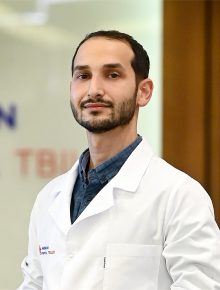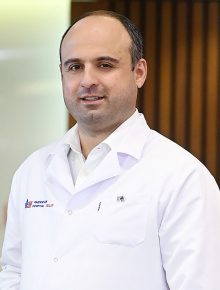We are dedicated to the diagnosis and treatment of heart rhythm disorders and we are among the most advanced national centers in this area.
The Hospital is a reference in the area of cardiac electrophysiology and Arrhythmology. Our technological resources are among the most advanced in the region and the medical teams are recognized for their vast experience.
Indications for observation by an arrhythmologist include:
- Symptomatology suggestive of cardiac arrhythmia like palpitations or feeling of rapid and / or irregular heartbeat, sudden dizziness or loss of consciousness, chest pain (tightness, burning) and/or shortness of breath, lasting more than a few seconds, arrhythmia detected on basal electrocardiogram, 24-hour Holter or prolonged monitoring device;
- Tendency to low heart rates (<50 bpm) associated with fatigue, reduced exercise tolerance, dizziness or fainting;
- History of atrial fibrillation with persistent symptoms despite drug treatment;
- Patient with pacemaker needing device evaluation;
- Patient with genetic cardiopathy.
What are the risk factors for arrhythmia?
Some factors may increase the risk of developing an arrhythmia. These include:
- Previous history of coronary heart disease;
- Prior heart failure or cardiac surgery;
- Congenital heart disease;
Excessive consumption of alcohol, coffee or nicotine, certain drugs, as well as oscillations in serum potassium or magnesium levels may also increase the risk of developing arrhythmia.
Some arrhythmias have an important genetic component. However, some people may experience arrhythmia even in the absence of any known risk factor.
Overview
We are dedicated to the diagnosis and treatment of heart rhythm disorders and we are among the most advanced national centers in this area.
The Hospital is a reference in the area of cardiac electrophysiology and Arrhythmology. Our technological resources are among the most advanced in the region and the medical teams are recognized for their vast experience.
Indications for observation by an arrhythmologist include:
- Symptomatology suggestive of cardiac arrhythmia like palpitations or feeling of rapid and / or irregular heartbeat, sudden dizziness or loss of consciousness, chest pain (tightness, burning) and/or shortness of breath, lasting more than a few seconds, arrhythmia detected on basal electrocardiogram, 24-hour Holter or prolonged monitoring device;
- Tendency to low heart rates (<50 bpm) associated with fatigue, reduced exercise tolerance, dizziness or fainting;
- History of atrial fibrillation with persistent symptoms despite drug treatment;
- Patient with pacemaker needing device evaluation;
- Patient with genetic cardiopathy.
What are the risk factors for arrhythmia?
Some factors may increase the risk of developing an arrhythmia. These include:
- Previous history of coronary heart disease;
- Prior heart failure or cardiac surgery;
- Congenital heart disease;
Excessive consumption of alcohol, coffee or nicotine, certain drugs, as well as oscillations in serum potassium or magnesium levels may also increase the risk of developing arrhythmia.
Some arrhythmias have an important genetic component. However, some people may experience arrhythmia even in the absence of any known risk factor.
Types of Arrhythmia
Arrhythmias are divided into two major groups:
- Those characterized by tachycardia, that is, elevated heart rates;
- Those characterized by bradycardia, that is, low heart rates.
However, the presence of tachycardia or bradycardia alone does not necessarily imply the presence of an arrhythmia.
Arrhythmias are also classified according to their region in the heart:
- The auricles. This group includes atrial fibrillation and flutter, supraventricular tachycardia, and Wolff-Parkinson-White syndrome;
- The ventricles. Included in this group are ventricular tachycardia and frequent ventricular extrasystoles.
Electrophysiological Laboratory
This laboratory is equipped with state-of-the-art three-dimensional mapping and fluoroscopy systems. Here, the invasive treatments of cardiac arrhythmias are performed, with the most common being the electrophysiological diagnosis, ablation of fibrillation, atrial flutter or tachycardia, ablation of supraventricular tachycardia, ablation of frequent ventricular extrasystoles, and implantation of cardiac devices including pacemakers, cardiac resynchronization devices and cardioverter defibrillators.



